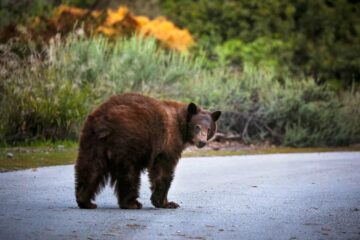Tejon Ranch halts hunting after state probe of cougar killings
Suspension is likely to be lifted by the fall hunting season, after ranch officials investigate operations. Kern County prosecutors are weighing charges in illegal hunting of the mountain lions.
Source of this article: The Los Angeles Times, January 21, 2012
Tejon Ranch announced Friday that it plans to suspend its lucrative hunting operations after a California Department of Fish and Game investigation into the illegal killing of mountain lions on the 270,000-acre property.
![67528361[1]](http://www.venturacountytrails.org/WP/wp-content/uploads/2012/01/675283611-300x168.jpg)
A tule elk on Tejon Ranch is shown. Hunting has been suspended on the property after California officials found mountain lions had been killed illegally. (Los Angeles Times)
Bron Sanders made the claims in a lawsuit filed May 3 in Kern County Superior Court. In an earlier interview, Sanders said he personally witnessed 20 mountain lions that were killed without authorization.
Sanders said the killings were motivated by angry sentiments among ranch managers toward a 1990 law that made hunting mountain lions illegal in California. He said managers also blamed mountain lions for eating game prized by trophy hunters who pay up to $20,000 to shoot elk on the ranch, about 60 miles north of Los Angeles.
Tejon Ranch officials said the lawsuit was recently settled.
State wildlife authorities completed their investigation late last year and forwarded the findings to the Kern County district attorney’s office, which is weighing possible charges. Kern County prosecutors declined to comment on the case.
Tejon Ranch officials initially denied the allegations, claiming they were “ridiculous and untrue.”
But in a statement Friday, Robert A. Stine, president and chief executive officer of Tejon Ranch Co., said the investigation determined that mountain lions were killed without authorization “in clear violation of company policy and the state statute regulating the take of mountain lions in California.”
“I was appalled and outraged when I learned the results of the investigation,” Stine said. “Tejon Ranch did not then, and certainly does not now condone such activity, and we sincerely regret that such activity took place on our ranch. Accordingly, we are taking every step necessary to ensure it won’t happen again.”
Tejon Ranch officials said the suspension will begin Jan. 30 with the cooperation of state and federal wildlife authorities and remain in force until the company completes an evaluation of its hunting operations, which generate up to $2 million a year in revenue for the company.
Tejon Ranch spokesman Barry Zoeller said: “We expect to resume hunting operations in time for the fall hunting season, but with more restrictions and fewer hunters.”
State law permits the killing of a mountain lion only if it poses a threat to humans or livestock. The hunter must obtain a state-issued permit and must present the carcass within 24 hours of the kill.
Any violation of the permit requirements is a misdemeanor punishable by imprisonment in the county jail for up to one year or a fine of up to $10,000, or both.
Sanders said his problems started in July 2005 after he killed his first mountain lion. The ranch had a permit for the kill, but Sanders said that Don Geivet, vice president of Tejon Ranch operations, told him: “Don’t call anyone about this, and do not turn that carcass in.”
Sanders said: “We got two to three mountain lions with that one permit.”


